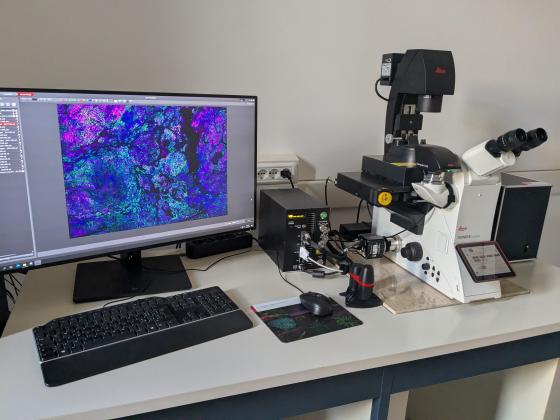LOCATION
Corso Europa, 26. Palazzo delle Scienze, IV floor, room IV.04
PRINCIPAL INVESTIGATOR
Dr. Teresa Balbi (Teresa.Balbi@unige.it)
Prof. Laura Canesi (Laura.Canesi@unige.it)
MISSION
The core facility provides advanced instrumentation that represents a strategic asset for the implementation of both basic and applied research projects, at national and international levels. Through morphological and functional analyses on fresh and/or fixed preparations of monolayer cells, 3D cell cultures, tissue sections, and organoids, as well as whole model organisms, it is possible to thoroughly investigate biochemical, physiological, and pathophysiological processes.
The technology implemented in the Thunder system is optimal for a wide range of biological applications in the environmental field (e.g., identification and characterization of invertebrates, developmental biology, monitoring of key aquatic ecosystem species, analysis of pollen and fungal species), biomedical field (e.g., regenerative medicine, stem cell research in oncology, bioengineering), and geological field.
The instrumentation can also be used in combination with advanced microscopy systems available at other DISTAV core facilities (Scanning Electron Microscopy Laboratory - SEM, Raman Spectroscopy and Microscopy Laboratory), as well as with the Stellaris 8 TAU-STED (Leica) confocal microscopy system at DIFILab.
OUR SERVICES
- High-resolution image acquisition in brightfield and/or fluorescence, with the possibility to apply Z-stack, multichannel acquisition, timelapse, multiposition and mosaic imaging, using the Thunder Imaging System with Computational Clearing
EQUIPMENTS
- Olympus IX53 inverted fluorescence microscope equipped with a UC30 CCD camera and digital imaging software (cellSens Entry)
- Leica DMi8 inverted fluorescence microscope equipped with THUNDER Imager 3D Cell System
PERSONNEL
Dr. Teresa Balbi - Researcher
TARGET USERS
- Internal researchers
- External collaborators (public and private institutions)
- PhD students, fellows, and post-doctoral researchers (upon completion of training)
HOW TO ACCESS
- Reservations by email (Teresa.Balbi@unige.it)
- Updated fee schedule available on the DISTAV website or upon request
COLLABORATIONS & NETWORKING
- Cross-disciplinary use by DISTAV users and co-funding institutions, representing an added value both in the development and planning of national and international projects, and in second- and third-level education and training
- Possibility to provide services to third parties and carry out activities under agreements with public institutions and private companies
CONTACTS
- Email: Teresa.Balbi@unige.it
- Phone: +39 0103538244
